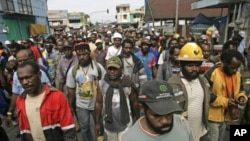In Indonesia, growing resentment about corporate profits has led to strikes that have temporarily closed one of the world’s largest gold and copper mines. With estimated losses of $6.7 million each day the mine is closed, analysts say Freeport is under increasing pressure to meet worker demands for higher wages.
Freeport labor employee
The Indonesian unit of the P.T. Freeport McMoran was forced to halt productions at its giant gold and copper mine in West Papua late Monday and Tuesday.
The company announced that it was suspending its operations after a pipe channeling copper and gold to the port was severed in several places, and workers blockaded the road to the mine with heavy machinery.
A Freeport spokesperson says the pipe was sabotaged.
The company declined to speculate on who might be responsible for the damage. Some 80 percent of Freeport’s workers are on strike for the second straight month.
Although negotiations between the company and the worker’s union have failed to produce an agreement on wage increases, the strikes around the mine have grown violent. Last week, a clash between protesters and police resulted in the death of one person and injured to six others. On Friday, three workers were shot dead in an ambush blamed on Papuan separatists.
Workers at Freeport’s Grasberg mine - which accounts for more than 90 percent of the company’s gold output - receive a minimum of between $1.50 and $3.00 an hour, the lowest of any Freeport McMoran operation, worldwide.
Julius Parorongan, a spokesperson for the Freeport Worker’s Union says the strike is the best way to make the multinational company take notice. “This is what we have to do, to force the management to fulfill our demands…. We will strike until November 15th or until we get a good deal… We just need $7.50 per hour and so far in the U.S. the lowest wages [for Freeport workers] is $30 per hour. So we think it is easy for the company to fulfill our demands,” he said.
The rugged region in eastern Indonesia has poor roads and other infrastructure in the mountainous terrain, which analysts say increases the cost of mining and depresses local wages.
Closure of the mine
During the initial stages of the strike, Freeport recruited outsourced workers which allowed it operate at 80 percent capacity. But Monday’s closure is likely to incur significant costs to Freeport and the Indonesian government.
Professor Kurtubi is a lecturer in economics at the University of Indonesia who specializes in mineral resource economics. He says the closure of the mine will have two main effects.
“First, it will have a negative impact on the economic activities in the surrounding areas because for most people who live in the Timika, their economy mostly depends on the mining activities," he said. "Second, the government revenue will decline. It’s quite significant the number if they cannot find a resolution.”
Freeport is the single largest taxpayer to the Indonesian government, contributing more than $1 billion in the first six months this year. Closure of the mine is estimated to cost the government $6.7 million in lost revenue per day.
Kurtubi believes Freeport will have to agree to the workers’ wage demands, if they want to continue operating at full capacity in the future. “Yes, I think Freeport should meet the demands of labor when they want just $7.50 per hour," he noted. "I think that is quite moderate, quite good, acceptable, considering the average wage in Freeport where they pay workers $20 per hour for the same product.”
Although the workers union has urged the government to help resolve the issue, Energy and Mineral Resources Minister Darwin Zahedy Saleh announced late Tuesday that Freeport Indonesia would resume 50 percent of its production this week, despite ongoing strikes and the damaged pipeline.












